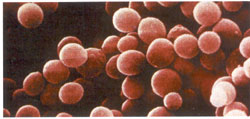| 2003 |

|
YEAR BOOK |
University College Dublin
|
Developing new targets for antibiotics
|

Identifying essential enzymes and processes in bacteria that are either unique or are substantially different from the host counterpart provides the best opportunity to elucidate new antibiotic targets. Two such enzyme targets that have emerged in the past few years are found in the pathway used by all cells to make Coenzyme A (CoA) from the vitamin pantothenic acid or B5. CoA is essential for numerous metabolic pathways including those central to the production of energy from glucose and fats. The cell can recycle CoA to some extent, but if it can no longer make CoA then it will ultimately die. The UCD group has worked on human CoA biosynthetic enzymes and shown that the last two pathway steps are actually catalysed by a single enzyme with two activities. However, in bacteria two separate enzymes carry out these steps and they are unrelated to the bifunctional human counterpart. Hence there is now much interest in developing drugs to block only the bacterial enzymes, and in doing so selectively kill the bacterial cells. In UCD, we are collaborating with a US pharmaceutical company to develop this approach. In particular staphylococcal enzymes are being targeted because resistance in this organism presents an increasing challenge for human health.
Contact: Dr Margaret Worrall, Department of Biochemistry and Conway Institute, UCD
E-mail: [email protected]